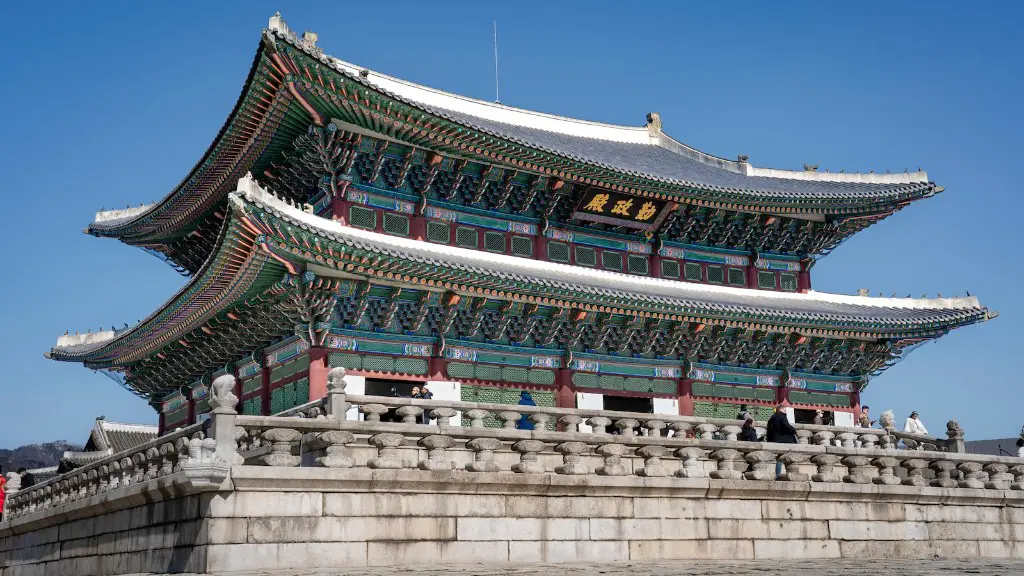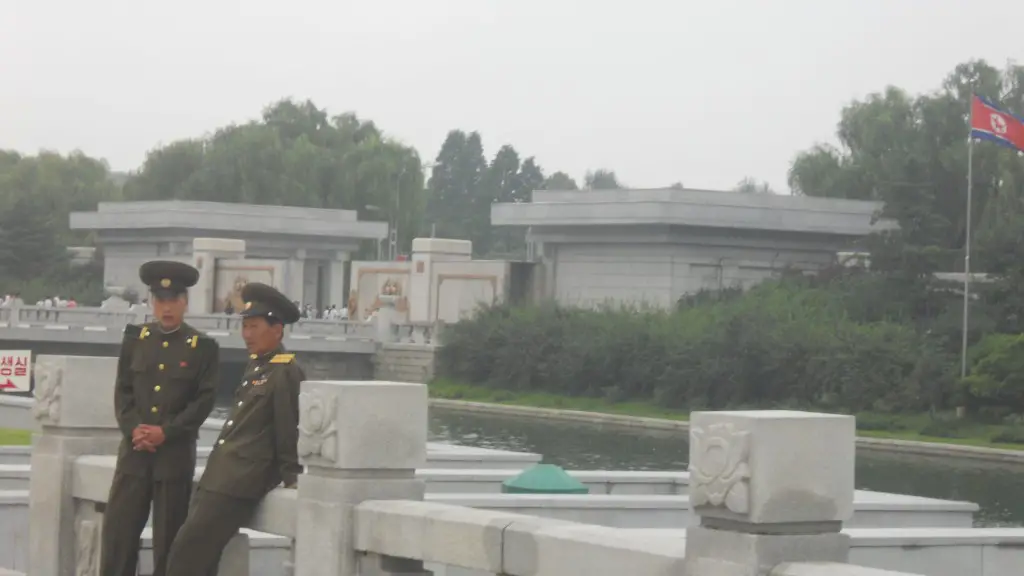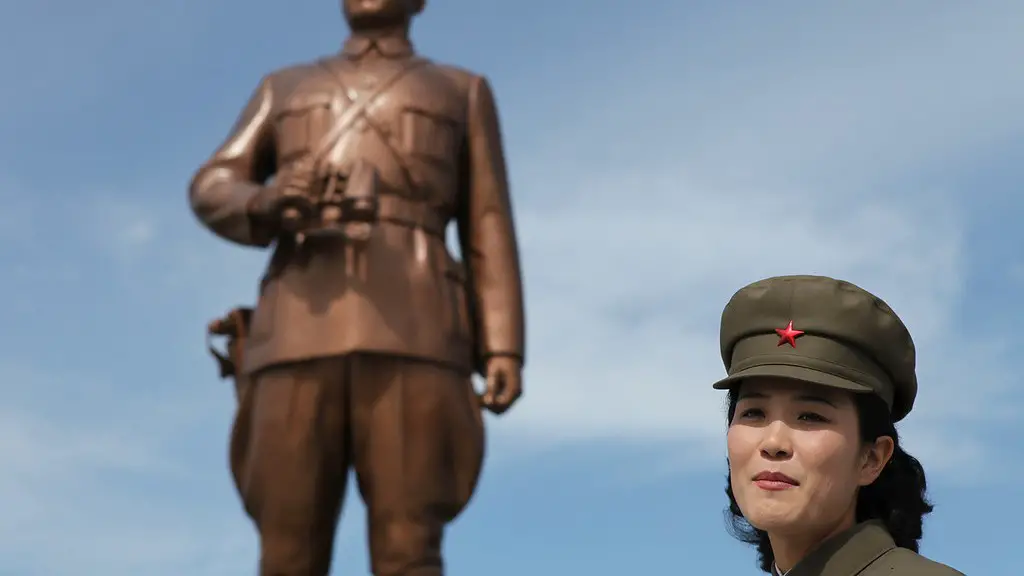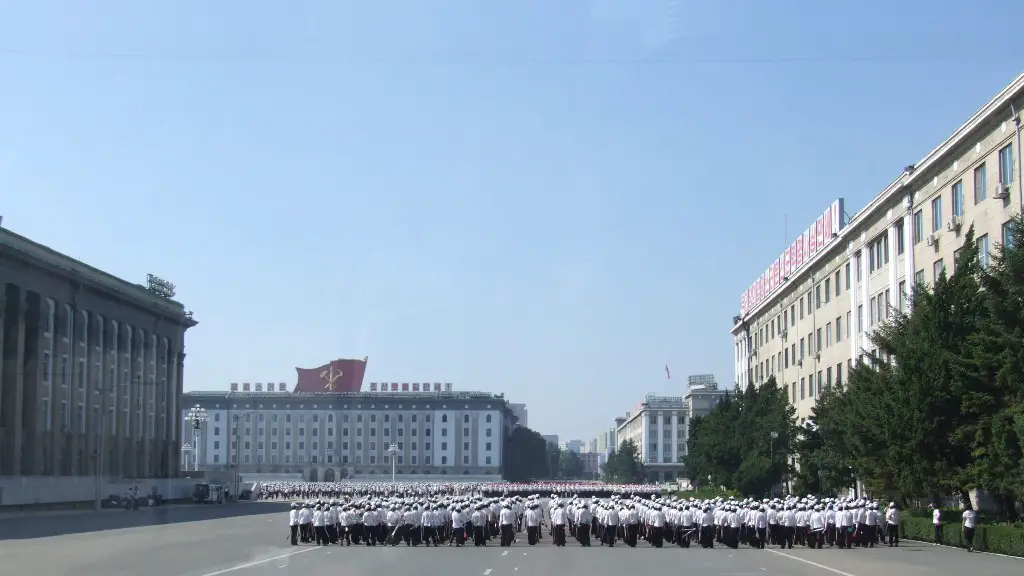As tensions between North Korea and the United States continue to rise, the world is divided in its opinions. North Korea is a closed country, so much of what is going on is speculation or unconfirmed reports. However, many analysts agree on the current situation between the two countries.
North Korea has been developing its nuclear program and has tested multiple missiles, one of which could be capable of reaching the US mainland. This has been met with strong condemnation from the US and other countries, leading to a cycle of threats and tensions.
The US responded to North Korea’s missile tests by conducting military exercises in South Korea, close to the North Korean border, in order to send a message of deterrence. This has been met with anger in North Korea, who sees it as a military provocation.
US president Donald Trump has had an antagonistic attitude towards North Korea, making many threats and provocative comments. This has been seen by North Korea as a sign of aggression, and their response has been to threaten the US with retaliation.
The US is working with South Korea and Japan to pressure North Korea into stopping its nuclear program. US Secretary of State Rex Tillerson has been leading efforts to reach a diplomatic solution, but North Korea has refused to be swayed by diplomacy. This has left the US with few options other than continued pressure or military action.
The international community has been divided in its response to the tensions between North Korea and the US. Some countries have sided with the US and its allies, while others have called for more diplomatic efforts to de-escalate the situation. However, both sides agree that there must be a peaceful resolution.
International Reactions to US-North Korea Conflict
The US-North Korea conflict has been widely discussed across the globe. Countries such as Japan, China, and South Korea have urged the US and North Korea to take diplomatic measures and prevent further escalation of the tensions. Many countries with close diplomatic ties to the US, such as the United Kingdom, have offered their support and called for a peaceful resolution.
However, the international community is also divided in how to deal with the situation. Russia and China have advocated for de-escalation, while certain countries like India have expressed their continued support of the US. On the other hand, some countries in South America and the Caribbean have denounced US foreign policy towards North Korea and called for negotiations.
All parties agree that any conflict should be avoided and a peaceful solution should be found. So far, no resolution has been reached and the conflict remains ongoing.
Effects on Global Community
The US-North Korea conflict has been a cause of concern for the global community. The security of the Korean peninsula is of the utmost importance, as any conflict in the region could have wide reaching and catastrophic consequences. In addition, the conflict has generated a wave of uncertainty among investors, as markets remain volatile due to the changing dynamics of the situation.
The conflict has also hindered progress towards denuclearization in the region, and caused a great deal of economic and diplomatic strain. North Korea’s missile tests have caused other countries in the region to increase their defense capabilities, further straining the regional economy.
The conflict has also increased regional tension and caused uncertainty and anxiety in the region. Given the volatile nature of the situation, there is a chance that the conflict could spiral into a full-scale war that would have devastating consequences.
Impact on US – North Korea Relations
The US-North Korea conflict has had a negative effect on relations between the two countries. The US has imposed multiple sanctions on North Korea and has called for North Korea to denuclearize. North Korea has responded with anger and has threatened to use its nuclear weapons against the US if it is attacked.
The US has also increased its military presence in South Korea in response to North Korea’s provocations, leading to further friction between the two sides. The conflict has also cost the US billions of dollars, as the US has had to spend considerable amounts of money to maintain its military forces in the region.
The conflict has also caused further mistrust between the two countries, as North Korea has accused the US of being aggressive and hostile. This has been compounded by US president Donald Trump’s rhetoric and provocative statements towards North Korea.
Furthermore, the conflict has resulted in North Korea isolating itself from the international community, as it is unwilling to accept any terms from the US. This has made a diplomatic solution to the conflict difficult, as North Korea is unwilling to communicate with the US or other countries.
Influence of China in US-North Korea Conflict
China has a major role to play in the US-North Korea conflict, as it is the only country that maintains diplomatic relations with North Korea. China has been instrumental in pressuring North Korea to take steps towards denuclearization, as it is aware of the dangers of a nuclear-armed North Korea. China has also been a strong advocate of diplomacy and has urged both sides to engage in dialogue and reach a peaceful resolution.
China has also used its economic leverage to pressure North Korea into compliance. China is North Korea’s largest trading partner, and China has used the threat of economic sanction to influence the behavior of North Korea.
In addition, China has been critical of US military actions in the region, as it fears that an increased US military presence in Southeast Asia could lead to an escalation of tensions. China has also urged the US to engage in dialogue with North Korea and work towards a diplomatic solution.
Youth View on US-North Korea Conflict
Young people are increasingly concerned about the US-North Korea conflict and its potential effects. Young people are concerned about the potential for war and the impact this could have on their lives. Moreover, young people understand the implications of nuclear conflict and the devastating humanitarian effects that would follow.
Young people are also concerned about the lack of diplomatic measures and the continued escalation of tensions. Many young people are calling for diplomatic solutions and a peaceful resolution to the conflict, instead of further military action.
In addition, young people are increasingly aware of their role in making a difference. Many young people have been taking part in protests and demonstrations against war and the threat of nuclear conflict. They understand the importance of speaking up and the power of collective action.
Young people are also vocal in their criticism of US president Donald Trump and his rhetoric against North Korea. Young people see him as a destabilizing force in the region, and see his rhetoric as a major threat to world peace.
Possibility for Peaceful Resolution
Despite the tension between North Korea and the US, there is still hope for a peaceful resolution. The international community has called for both sides to refrain from provocative actions and engage in meaningful dialogue in order to reach a diplomatic solution.
North Korea has also been receptive to diplomatic efforts and has recently expressed an openness to engage in negotiations. Many countries, including the US, have welcomed this gesture and are optimistic that it could lead to a resolution of the conflict.
However, there are still obstacles to achieving a peaceful resolution. North Korea continues to pursue its nuclear program, and the US has opposed any softening of the sanctions against North Korea. Moreover, the continuing mistrust between the two countries complicates any potential negotiations.
Despite these challenges, there is still hope for a peaceful resolution. To achieve this, both sides must compromise and engage in meaningful dialogue in order to find a pathway towards peace.





